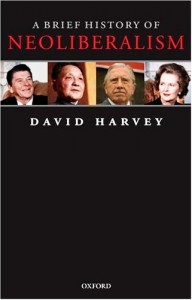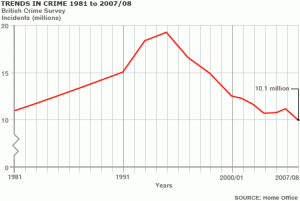 Just a few notes and key points from this excellent book by Ha-Joon Chang –
Just a few notes and key points from this excellent book by Ha-Joon Chang –
The book basically busts a lot of neoliberal myths. It’s worth noting from the outset that Chang isn’t a Marxist, he accepts that market systems are basically sound, and argues that what we need is a more globalised – Keynsian style of regulation to prevent neoliberal strains of free market fundamentalism.
The book is, unsurprisingly, split into 23 chapters – each chapter briefly outlines ‘one thing market fundamentalists tell us about Capitalism’ and then looks at criticisms of what we are told, thus myth busting neoliberalism and showing it up for the flawed ideology that it is.
To my mind, this is an excellent book, that finds the right balance between an academic and populist tone – the criticisms of Capitalism are made using both easy to understand analogies and stories as well as hard historical – statististical data.
Teachers of A level Sociology can use elements of this in the Global Development Module, or even to illustrate Marxist ideas of ideology (although I imagine more than half of your students just wouldn’t get it!)
Just a few of my favourite myth-buts of neo-liberalism (I’ll add in a more details later!)
Thing 1 – There is no such thing as a free market – Even today markets are regulated at both an international and national level – the most obvious example of this being immigration controls, which, if removed, would lead to mass migrations and significantly lower wages for people in the developed world. Other examples include there not being markets in people (no slavery), organs, and the fact that child labour is illegal.
We regulate some markets to such an extent that we ban trade all together, and thus it is clear that what counts as a ‘free market’ is a political decision. The ‘free market’ today isn’t something that just exists independently of the political sphere – freedoms are restricted when trading in certain goods and services are deemed too harmful or morally unacceptable. This of course lays the foundation for arguing that we should regulate speculative financial and commodity markets given the harm that they cause.
Thing 2 – Companies should not be run in the interests of their owners – what Chang means by this is that companies should not be run in the interests of shareholders – because shareholders are always after short term returns on their investment – and thus companies are run by managers in order to maximise short term returns (year on year dividends) rather than longer term productivity growth. – Later on in the book (see thing 18) Chang outlines how General Motors recently failed to invest in new technologies to make better cars – which would have made them more competitive with foregin companies, but instead invested billions in setting up new financial services because the short term return on the later was greater – thus pleasing shareholders. The end result of this is that what was once the biggest and most productive company in America was transformed in the space of three decades into a basket case that had to go begging to the US government for a bail out – but the shareholders did very nicely, and now their money’s elsewhere – it’s just the workers and the tax payer that suffered!
In this chapter Chang also provides a brief overview of the development of the Corporation – essentially it emerges that three innovations in Corporate development since the the beginning of last century have lead to the disaster that is modern capitalism – firstly, limited liability, secondly the rise of the managerial class (rather than individual Capitalists) running firms and finally the rise of shareholder ownership – these three things combined, which on their own are not necessarily in themselves bad and were in fact either necessary or desirable to keep Capitalism profitable, these three things combined have created the conditions that make companies work against the interests of the country – because now we have managers who are covered by limited liability and thus free to take risks that are beholden to shareholders to make short term gains. Chang’s not a Marxist, but I’d say this looks like a fetter situation!
Thing 7 – Free-market policies rarely make poor countries rich
Chang points out that, with only a few exceptions, all of today’s rich countries have become rich through a combination of protectionism, subsidies and other policies that they advise developing countries not to adopt.
Looking at China as a case study – until a decade ago, China was highly protectionist, with an average industrial tariff rate well above 30%, and very visible trade restrictions still remain. The country has restrictions on cross-border flows of capital, a state owned and highly regulated banking sector, and numerous restrictions on foregin ownership of financial assets. Foreign firms often complain about being discriminated against. The country has no elections and is riddled with corruption and has complicated property rights. In particular, its protection of intellectual property rights is weak, making it the piracy capital of the world. The country also has a large number of state owned companies which are propped up with subsidies!
Chang then goes into a wonderful section in which he looks at the economic policies put forward by the previous American Presidents that appear on the different bank notes – many of them protectionist – policies correlated with economic growth throughout previous decades. This deserves a post on its own so I’ll save this for later!
America and China are not exceptions (even if they were – these, along with the UK are the two most significant economic powerhouses to have shaped history -OK with China I’m getting a bit Futerist – sorry about that – as a rule I don’t trust Futerists – and neither should you) – there are many countries in different situations that have witnessed economic growth while practising protectionist economic policy – Finland, Denmark, Germany, Taiwan, Korea and Switzerland are all examples.
Most importantly for early econmic development is the protection of ‘infant industries’ – virtually all of today’s rich countries did this early on, and most of them severley restricted foreign investment.
There are essentially three reasons why developing countries should adopt protectionist economic policies rather than opening themselves up the international free market forces –
1. Developing countries are, by definition, undeveloped, they are thus in no state to compete on the world stage with devleoped economies and their advanced technologies and managerial efficiencies. In a similar way, you would not send your 6 year old son out to compete with 26 year olds, you would protect him from the labour market and send him to school, so that when he reaches his 20s he is better educated and thus more competitive. Developing countries should protect their infant industries in a similar way.
2. In early stages of development, markets are especially vulnerable to manipulation by big (read here foreign) actors – and so the government needs to restrict thier behaviour.
3. the govt. needs to do many things itself because there are not enough private sector firms capable of providing what is needed for development.
Despite the above, the IMF has encouraged developing countries to open up their borders and expose their economies to the full force of global competition, using the conditions attached to aid. It’s been a case of ‘do as I say, not do as I did’.
Developing countries have seen a slow down in economic growth since the introduction of free market economic reforms in the 1980s – the 1960s to 70s saw annual growth of 3% while the era of free market reform 1980 -2000 saw growth, but this declined to 1.7%.
To summarise, few countries have become rich through free-trade, free-market policies and few ever will.
Thing 9 – We do not live in a post-industrial age
On the service it appears that manufacturing in the UK has declined hugely in significance – as evidenced by ‘deindustrialisation’ – in the 1970s 35% of the workforce were employed in manufacturing, but this has now dropped to just over 10%. The general line on this is that this doesn’t matter because we are now a post-industrial economy with more people employed in R and D and the service sectors.
However, if you look at things in terms of production and consumptin – it becomes apparent that the decline in manufacturing has not been as rapid as it at first appears – even though we spend more today on services (haircuts for example) – and we spend relatively less on computers – or we might spend as much as we did ten years ago but buy more of them – this is because computers are relatively cheaper than they were ten years ago while haircuts are relatively more expensive. This, in turn, is because computers, and most other industrial products, have become cheeper to manufacture because of productivity growth – technogical innovation meens you can get more computers per worker and so the cost goes down – something which simply cannot happen with haircuts and other face-to-face service jobs to anything like the same extent.
The problem a country like Britain has now got is that many service jobs depend on the industrial sector (most service jobs invovle working with stuff that’s been manufactured somewhere) – but we now have less control over the stuff we produce. Also, it’s difficult to see where our service sector can grow – as services, compared to physical products, are harder to export – consider the lanuguage barriers for a start – and this may well explain our declining rate of econmic growth – in other words, the idea that a service sector economy can carry on growing is pretty much a myth – there are huge barriers to this happening.
Thing 10 – The US does not have the highest living standard in the world
Thing 13 – making rich people richer doesn’t make the rest of us richer
Thing 23 – Good economic policy does not require good economists.
As always, there are some great reviews on Amazon!
 This provides a potential missing link between system and agency in explaining why inequality leads to violence such as riots… How Growing Inequality Hurts the Middle Class by Robert H. Frank (2007) – Even though it’s not focussed on those suffering real deprivation – if inequality hurts those in the middle this much – it can surely be applied to help explain why the really deprived in unequal societies might occassionally display signs of anti-social behaviour… Of course you may have seen this, but it’s relatively new to me, even though it’s four years old…
This provides a potential missing link between system and agency in explaining why inequality leads to violence such as riots… How Growing Inequality Hurts the Middle Class by Robert H. Frank (2007) – Even though it’s not focussed on those suffering real deprivation – if inequality hurts those in the middle this much – it can surely be applied to help explain why the really deprived in unequal societies might occassionally display signs of anti-social behaviour… Of course you may have seen this, but it’s relatively new to me, even though it’s four years old…









